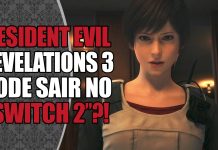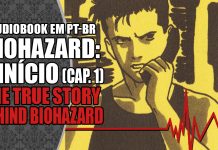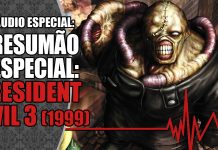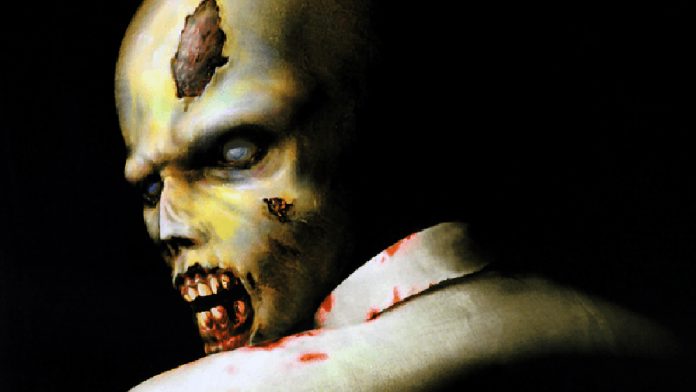O escritor Philip J. Reed, fã da franquia Resident Evil e intrigado pela falta de informações acerca da produção do primeiro Resident Evil, lançado em 1996 no Japão, decidiu se aventurar por uma árdua busca pelos pedaços de informações espalhadas pela internet sobre a criação da obra que definiria o gênero do Survival Horror e traria os zumbis de volta aos holofotes do horror, e pelos atores e dubladores que participaram da abertura e da dublagem do jogo, para compilá-las todas em um único lugar.
O Resident Evil Database teve a incrível oportunidade de não só ficar a par do processo de criação do livro, mas de recentemente bater um papo com o autor para entender como surgiu a ideia de escrever este livro e muito mais!
→ Please click here to read the original interview in English!
Entrevista Traduzida:
Como você acabou escrevendo um livro da franquia Resident Evil?
Com um pouco de sorte! Eu sempre fui um fã da Boss Fight Books desde quando começaram vários anos atrás. Cada um dos seus livros foca em um jogo de videogame diferente, e usa este jogo para discutir tópicos relacionados também. Seus melhores livros realmente levam seu leitor por uma aventura, e pensei muitas vezes sobre que tipo de livro eu gostaria de sugerir a eles, mas nunca encontrava a ideia perfeita.
Então um dos meus grandes amigos postou um material de retrospectiva sobre Resident Evil no YouTube, o que me trouxe várias lembranças. Isto me inspirou a re-jogar pela primeira vez em anos. Como adulto agora, alguém que gosta de bons filmes de terror e ama os ruins, eu pude entender Resident Evil muito mais. A Mansão Spencer era como um compilado do melhor da história do terror. Prestou homenagem ao passado e também cimentou as regras para o Survival Horror, um gênero que se ampliaria no futuro.
Foi o pivô perfeito entre horror passivo e terror interativo. E eu pensei, “Bom, aí está meu livro da Boss Fight Book!”.
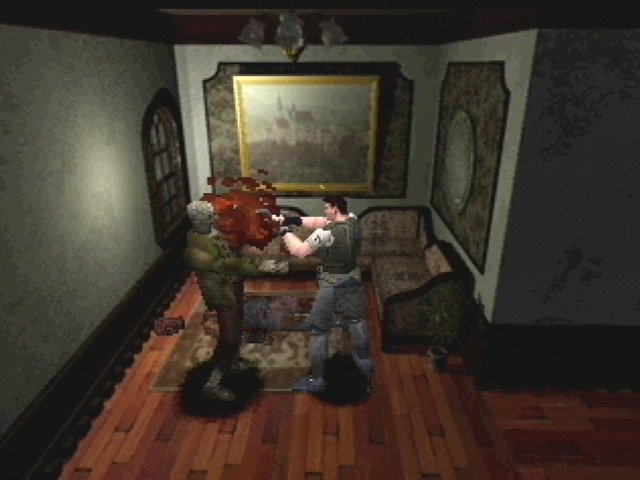
Pode nos contar sobre sua experiência com a série?
Eu joguei o primeiro logo que lançou, graças a um amigo. Eu não tinha um Playstation, mas ele, sim. Ele trouxe pra jogarmos porque ele sabia que o jogo me assustaria, e ele estava certo. Ele achou aquilo bem divertido! Esta era a versão antes do Director’s Cut colocar a mira automática, então foi facilmente o jogo mais difícil que já joguei também. Era assustador, difícil e eu odiei, e eu também não conseguia parar de jogar.
Eu não joguei os jogos seguintes, mas comprei Resident Evil 4, assim como todo mundo do planeta. Eu sei que esta é uma perspectiva em comum, mas acho este jogo mais assustador que o primeiro. No primeiro, eu sentia que conseguia potencialmente “entender” a Mansão Spencer. Podia sobreviver superando os problemas. Em Resident Evil 4, o fato de ser mais focado em ação significava que eu tinha que lutar. Isto é muito mais assustador pra mim! Eu sou bem mais de pensar do que de lutar.
Eu também joguei o Remake para Gamecube do primeiro jogo, que até hoje é um dos meus jogos favoritos da vida. É tão perfeitamente fiel ao espírito do original sem repetir demais o que já vimos. A história de Lisa Trevor também me assombra desde então. Ela ganhou um capítulo inteiro no livro.
Nos anos seguintes, eu joguei todos os jogos de Resident Evil e os spin-offs, mas o primeiro jogo, o Remake e Resident Evil 4 foram definitivamente os que causaram maior impacto em mim. Eu quero também citar o CODE: Veronica, que tem sido um dos jogos favoritos da série de se redescobrir.
Pode nos contar um pouco sobre o conceito do livro?
É claro! O livro destrincha o jogo, basicamente, assim como destrincharia um filme de terror. Podemos ver, exatamente, o que o “diretor” está fazendo a cada cena. Falamos sobre como ele enquadra as cenas. Falamos sobre como ele posiciona os atores onde precisa que estejam. Falamos sobre como ele faz os momentos serem o mais assustadores que puder. Todos se lembram dos cachorros quebrando as janelas, mas por que nos lembramos disso? Não é só porque isto assustou; muitas coisas assustam pessoas e a maioria se esquece. Mas todos que jogaram lembram dos cachorros. Este livro pega momentos como este e os disseca para descobrirmos como eles funcionam.
Além disso, eu queria aprender como o terror funciona psicologicamente. Eu posso destrinchar cada cena assustadora e dizer o que está acontecendo, o que os personagens estão fazendo, como os monstros são apresentados… mas não sou capaz de te dizer o que acontece no meu cérebro, ou porque eu pulo quando me assusto, ou porque minhas mãos suam ao jogar um jogo assustador. Tive o prazer de falar com dois especialistas exatamente sobre isto. Graças a eles, o livro discute também o que acontece na tela quanto o que acontece em nossas mentes. É bem fascinante!
Minha questão principal quando comecei a escrever este livro foi, “O quanto este único jogo nos ensina sobre terror em geral?”. A resposta foi “Na verdade, muito!”.
Quais foram os seus principais desafios enquanto escrevia o livro?
Eu realmente queria as histórias completas tanto dos dubladores quanto dos atores. Existe muita boa informação sobre os atores na internet – incluindo em seu site, que me foi de grande ajuda – mas não havia nada compilado num lugar só. Não havia uma história para ler com começo, meio e fim. Então pensei em procurar os próprios atores e ouvir deles exatamente como as coisas aconteceram, então pude contar a história completa diretamente das pessoas envolvidas.
Foi divertido, mas não foi fácil. Procurar os atores foi difícil. Falar com eles foi ainda mais. O dublador que fez a voz do Barry recebeu tanto assédio online que não queria falar comigo. Ele tinha medo que eu fosse escrever um livro que pudesse humilhá-lo. Me senti terrível por não conseguir convencê-lo do contrário, mas ele foi tão ofendido que não se interessou. Então, eu entrevistei outro dublador e esta pessoa foi até o dublador do Barry e disse, “Tá tudo bem. Não é um aproveitador. Você poderá contar sua história”. Não direi quem foi, mas esta pessoa realmente me ajudou. A história do Barry foi uma das melhores partes do livro, e me sinto muito grato por ele ter decidido me contar no fim das contas. No final, pude ouvir a de todo mundo, de todo o elenco vivo, exceto de um. Foi incrível!
Outro grande desafio foi a quantidade de desinformação na internet. Isto deixou meu trabalho muito mais difícil. Eu encontrava algo que parecia interessante, trabalhava pra verificar e descobriu que era falso. Sabia que o Barry já dublou Porco Rosso? Interessante, mas não é verdade. Sabia que a voz do Enrico Marini é do narrador do Super Smash Bros.? Também é interessante, e também não é verdade. Sabia que o dublador do Chris morreu em um acidente de carro? Novamente, não. É frustrante ter que encontrar a verdade por trás destas coisas. As pessoas leem informações falsas, repetem e outros pegam. Isto torna encontrar a verdade muito mais difícil do que deveria. Espero que este livro ajuda a esclarecer muitas destas coisas!
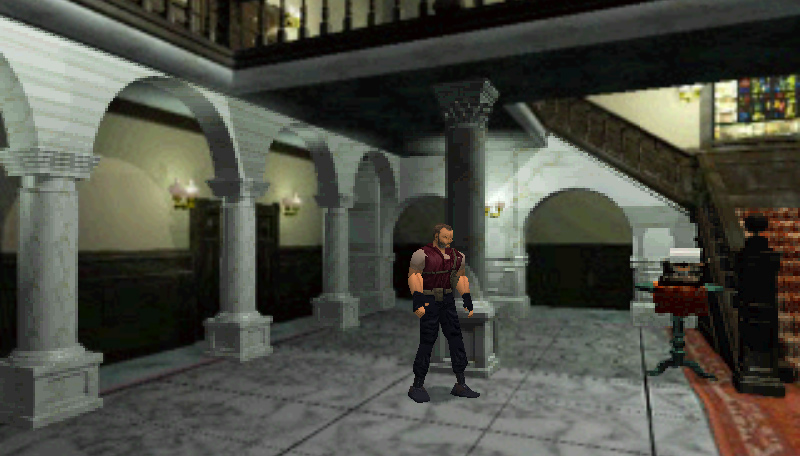
Existem planos do livro ser lançado em outros idiomas, como o português?
Esta é uma pergunta excelente e eu adoraria ter uma resposta mais direta. Se vocês tiverem interesse em ter o livro traduzido em outros idiomas, contatem a Boss Fight Books e fale com eles. Se souberem que existe público, mais chances de considerarem uma tradução. É uma publicação pequena, então obviamente não podem lançar em todas as línguas, mas eles já lançaram traduções no passado. Se o livro vai vender bem em inglês será provavelmente um fator também.
Eu realmente espero que seu público possa dar uma chance ao livro. Foi muito divertido de escrever, e me sinto privilegiado por poder compilar tanto da rica história do jogo a partir de fontes primárias. Espero que os leitores curtam tanto quanto eu adorei escrever.
Original Interview in English:
How did you end up writing a book about the Resident Evil franchise?
With a bit of luck! I’ve been a fan of Boss Fight Books since they launched several years ago. Each of their books focuses on a different video game, and uses that game to discuss related topics as well. Their best books really take the reader on an adventure, and I’ve thought many times about what kind of book I’d like to pitch them, but I never hit upon the right idea.
Then one of my good friends posted some retrospective material about Resident Evil on YouTube, which brought back a lot of memories. It inspired me to replay it for the first time in years. As an adult now, one who likes good horror movies and loves bad ones, I was able to understand Resident Evil so much better. The Spencer Mansion was like a best-of compilation of horror history. It paid homage to the past, and it also cemented the rules for survival horror, a genre that would stretch forward into the future.
It was a perfect pivot point between passive horror and interactive horror. And I thought, “Well, there’s my Boss Fight Book!”
Can you tell us about your experience with the series?
I played the original soon after release, thanks to a friend. I didn’t own a PlayStation but he did. He brought it over because he knew the game would scare the hell out of me, and he was right. He found that very amusing! This was the version before Director’s Cut restored the lock-on aiming, so it was easily the most difficult game I had ever played as well. It was scary and hard and I hated it, and I also couldn’t stop playing it.
I didn’t play the next few games, but I did pick up Resident Evil 4, just like everybody else on the planet. I know this is an uncommon perspective, but I thought that game was scarier than the first. In the original game I felt as though I could potentially “figure out” the Spencer Mansion. I could think my way through the problems. In Resident Evil 4, the fact that it’s more action-oriented meant I had to fight my way out instead. That’s much scarier to me! I’m more of a thinker than I am a fighter.
I also played the GameCube remake of the first game, which to this day is one of my favorite games overall. It’s so perfectly true to the original’s spirit without repeating much of what we already knew. The Lisa Trevor story has also haunted me ever since. She gets an entire chapter in the book.
In the years since, I’ve played just about every Resident Evil game and spinoff, but the first game, its remake, and Resident Evil 4 were definitely the ones that had the biggest impacts on me. I do want to give a shout-out to Code Veronica, too, which has been my favorite game in the series to rediscover.
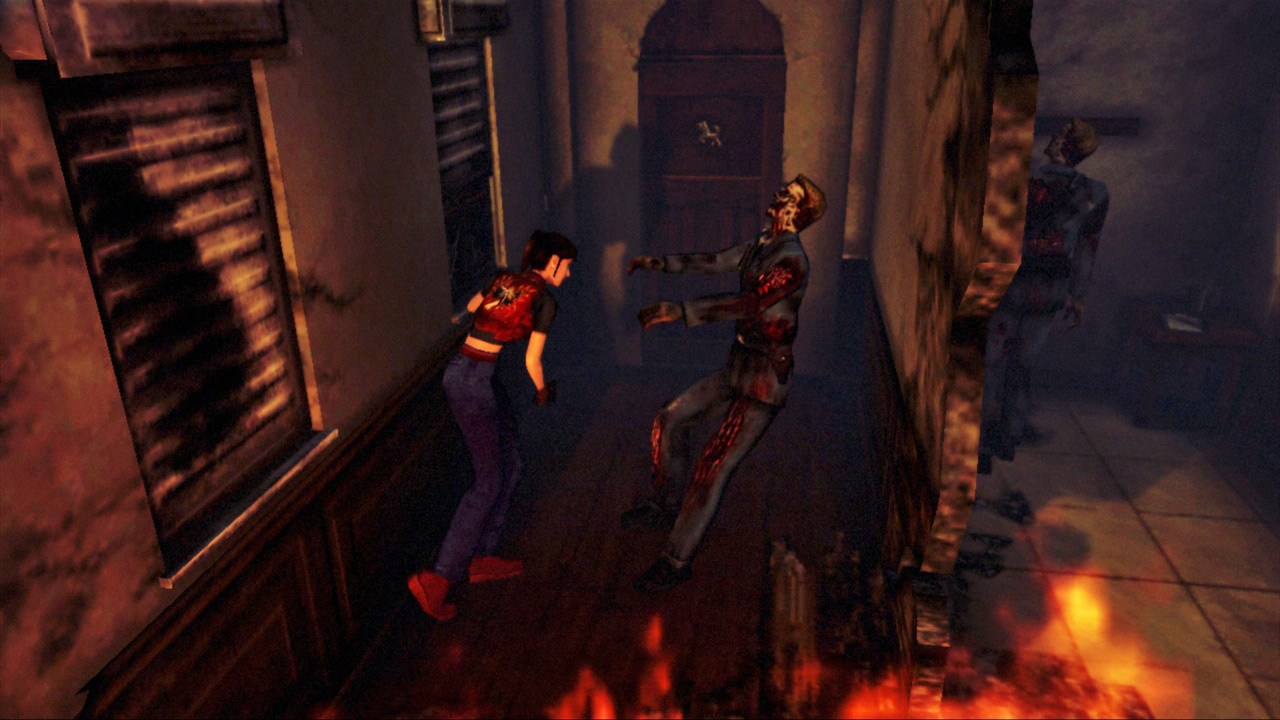
Can you tell us a little about the concept of this book?
Gladly! The book breaks the game down, basically, as one would break down a horror film. We get to see what, exactly, the “director” is doing in each scene. We talk about how he frames his shots. We talk about how he gets his “actors” where he needs them to be. We talk about how he makes his scary moments as scary as possible. Everybody remembers the dogs crashing through the windows, but why do they remember that? It’s not only because it scared them; many things scare people and most of them are forgotten. But everybody who played the game remembers those dogs. This book takes moments like that and dissects them so that we can discover what makes them work.
In addition, I wanted to learn how horror works psychologically. I can break down a scary scene and tell you what’s happening, what the characters are doing, how the monster is portrayed…but I can’t tell you what’s happening in my brain, or why I jump when I’m startled, or why my hands get sweaty while playing a scary game. I had the pleasure of speaking with two specialists about exactly that. Thanks to them, the book discusses both what happens on the screen and what happens in our minds. I think it’s pretty fascinating stuff!
My main question when I started writing this book was, “How much can this one single game teach us about horror in general?” The answer was, “Quite a lot, actually!”
What were the main challenges you had to face when you were writing it?
I really wanted to write the full stories of both the voice actors and the live actors. There is a lot of great information about these actors online – including at your site, which was a huge help – but there was nothing that brought it all together. There was no story to read with a beginning, middle, and end. So I thought I’d reach out to the actual actors and hear from them exactly how things unfolded, so I could tell the complete story directly from the people who were involved.
It was fun, but it wasn’t easy. Tracking down the actors was tough. Getting them to talk was tougher. The actor who voiced Barry has received such abuse online that he didn’t want to speak with me. He was afraid I would write a nasty book that humiliated him. I understood totally where he was coming from. I felt terrible that I couldn’t convince him otherwise, but he’s been bullied so much that he wasn’t interested. Then I interviewed a different voice actor, and this person reached out to Barry’s voice actor afterward and said, “It’s okay. This isn’t a hit piece. You’ll get to tell your story.” I won’t say who that was, but this person really helped. Barry’s story is one of the best parts of the book, and I feel so grateful he decided to give it to me after all. In the end, I got to hear from every known, surviving cast member except for one. That’s pretty great!
The other big challenge was the sheer amount of misinformation online. That made my job so much for difficult. I’d find something that seemed interesting and then work really hard to verify it, only to learn that it was false. Did you know Barry voiced Porco Rosso in an early dub? Interesting, but not true. Did you know Enrico Marini is voiced by the Super Smash Bros. announcer? Also interesting, also not true. Did you know Chris Redfield’s voice actor died in a car accident? Again, nope. It’s frustrating to have to find the truth behind these things. People read false information, they repeat it, and then others pick it up. That makes finding the truth much more difficult than it should be. Hopefully this book helps to clear up a lot of these things!
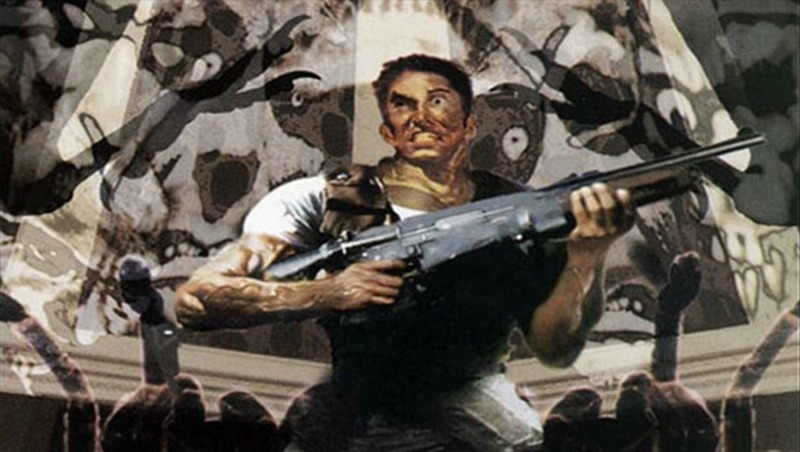
Any plans for this book to be launched in other languages, like portuguese?
This is an excellent question and I wish I had a more direct answer. If you are interested in seeing the book translated into other languages, contact Boss Fight Books and let them know. If they know there’s an audience, they’re more likely to consider a translation. It’s a small press, so they obviously can’t cater to every language, but they have released non-English translations in the past. Whether or not the book sells well in English will likely be a factor, too.
I do hope your readers get to experience the book. It was a lot of fun to write, and I feel privileged that I was able to compile so much of this game’s rich history from first-hand sources. I’m hoping readers enjoy it as much as I enjoyed writing it.

